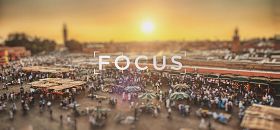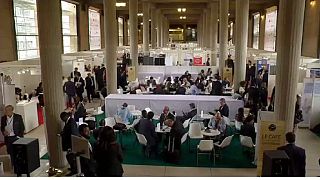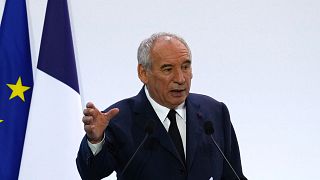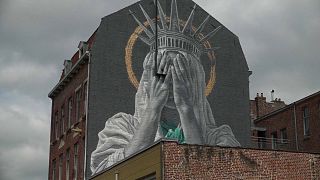Focus Africa
The French capital last week hosted a unique gathering – Les Recontres Africa – a two-day meeting to unite prominent politicians with business leaders to boost investment, stimulate innovation and most of all, develop sustainable growth.
To do that, and more, means challenging preconceived ideas, according to Benin’s former prime minister Lionel Zinsou. He now heads AfricaFrance, an organisation that brings together young entrepreneurs with established business and civic leaders.
“In Africa now, there are consumers who have rights, that’s completely new. There are people who have the right to choose their leaders, that’s completely new; it’s still difficult! But at least there’s progress,” said Zinsou. “There’s public opinion which is respected, and there are companies which can contribute to creating wealth. What’s extraordinary is that it’s taken 50-years to allow the public, business, intellectuals, and citizens to express their views. It’s incredible,”
Sentiments shared by several others at the forum who warmly welcomed the fact that French and other foreign firms are now beating a path to make the most of Africa’s potential.
The former president of French football club Olympic Marseille is Pape Diouf, who’s now backing a venture to expand the use of fibre-optics and new technology across the continent.
“We know that nature hates a vacuum and certain emerging countries have occupied the territory, even certain South American countries, like Brazil. So, I think France was to strengthen, come back and that seems to me a good idea, especially in today’s climate,” Diouf explained to Africanews.
Thierry Barbaut has been actively involved in African affairs for over two decades. He advises on media and new technologies solutions and now feels the winds of change are bringing favourable economic winds from all corners of the earth to Africa: “Today they’re all turning towards Africa and saying ‘we’re going to do business there, it’s a emerging colossal market. So, at last, in my lifetime, I’m seeing this small revolution, this industrial revolution, this new technology revolution which is bringing the rest of the world to Africa, and perhaps will lead to Africa being the engine of global growth.”
Digital and new technologies were the buzz words throughout the conference with Africa data hungry. Ivory Coast is one of many countries keen to diversify its economy by investing in its infrastructure. Ivorian Prime Minister Daniel Kablan Duncan said depressed commodity prices have forced his and other countries to develop new areas in which to diversify.
“Our object between 20016-2020 is to double our growth from 7 to 15 percent in relation to technology in Ivory Coast. We’re finalising the installation of 2,000km of fibre optics in Abidjan, that will give us a total of 7,000km throughout Ivory Coast, which will be completed by the end of next year. That will allow all companies operating in the country, regardless of where they are to communicate with their headquarters, Abidjan, other big cities and the rest of the world,”
Small and medium sized business owners also had several opportunites to meet and share their concerns during Les Recontres. Boosting the roles of women in business was a big question which sparked lots of debate.
Fatou Diaw, president of Organisation of African Business women, came to Paris to promote her “village vert” or “green village” scheme. The plan is to make thousands of Senegalese rural areas completely self-sufficient on solar and renewable energies.
But her visit also had a wider dimension – that of bringing women to the forefront of business: “Women make a considerable contribution to business in their countries but it’s often unrecognised so we need to change our structures. What I’m trying to do in Senegal is accompany women to do that.”
Some workshops concentrated on how to develop arts and culture across the continent as new digital innovations and changing consumer habits make the industry a key sector for growth.
“Africa will need more involvement from investors and culture is an area where we increasingly need private firms,” said Fanny Aubert Malaurie, cinema consultant for Institut Francais. “They’re the businesses which will equip Africa with fibre optics, satellites but it’s also the young who’ll develop musical structures, structures for cinema. We need African producers, we need technicians, we need TV channels that can exist and survive,” she added.
Despite its name, Les Recontres was not an exclusively French affair. Business leaders from anglophone countries, like the head of Kenya Airways said Africa is increasingly becoming one world, thus making business easier.
“Coming here, even though the majority of companies are French and even though the majority of the African companies are participating are French, we still have a lot in common and a lot to in connecting,” said Dennis Awori, chairman of Kenya Airways.
There was a huge wave of optimism about the future during Les Recontres which many participants hope will spread far beyond France; provided those who fear investing take a leap of faith according to Nadia Toby Eko, director general of Congolese firm International Transit and Transport.
“We have potential investors in Africa and it’s going well but the problem is they need reassurance because they’re going into the unknown. It’s not easy to go into Africa because we always hear about sickness, catastrophes and war; but there is so much more. There’s lots of potential in Africa and many untapped sectors that need to be developed. Africa needs expertise,”




![African meeting in Paris by business leaders 2016 [The Morning Call]](https://static.euronews.com/articles/344768/320x180_344768.jpg)







11:19
Cocoa is under pressure while East African economy is on the rise {Business Africa}
11:17
Bridging the legal gap in Africa’s digital boom {Business Africa}
01:53
SMES under pressure as business confidence hits four-year low in South Africa
01:54
"Great economic potential in Africa": five African leaders have lunch with Trump
11:19
Cyber Africa Forum highlights Benin's bold digital resilience [Business Africa]
Go to video
World Bank grants South Africa $1.5B for infrastructure, green energy